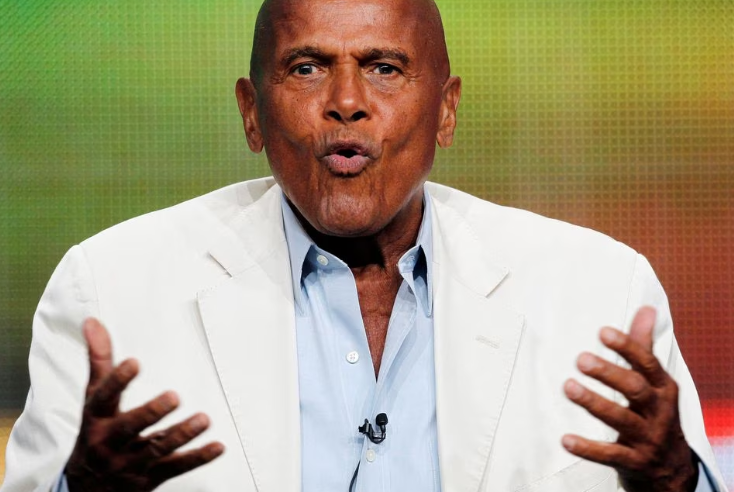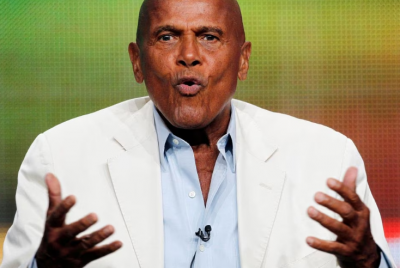American singer and human rights activist Harry Belafonte, who broke into the pop charts and shattered racial barriers with Martin Luther King in the 1950s, becoming a key figure in the civil rights movement, has passed away. Belafonte's legacy in entertainment spans many decades. In the mid-1940s, he discovered his love for the arts in an integrated theater in New York. Since then, he received Grammy, Tony, and Emmy awards for his unique style in popular music and songwriting, but his most notable work was in advocating for civil rights alongside his late friends Martin Luther King Jr. and Sidney Poitier. Belafonte never missed an opportunity to use his platform in the arts to highlight the issues facing the world.
Born to Jamaican immigrant parents, Harold George Belafonte Jr. was born on March 1, 1927, in Harlem, New York. After his parents divorced in 1932, he was sent to live in Jamaica with his grandmother. Upon returning to New York in 1940, he enrolled at George Washington High School but dropped out to join the Army, serving in the Navy during World War II. After returning from the war, he worked as a singer in clubs and a janitor in an apartment building. In December 1945, a tenant gave him tickets to see his first performance at the American Negro Theatre, titled "The Country Is a Hunter," written by Samuel M. Koots. From that moment, he fell in love with acting.
### Civil Rights Work
Belafonte worked in the civil rights movement with Paul Robeson and Martin Luther King. He was deeply pained to see his mother, Melvine, working as a seamstress and maid, without fair wages to pay the bills. She urged him to be aware of injustice and to never miss an opportunity to fight against it. In his 2011 memoir, "My Song: A Memoir," Belafonte wrote that Paul Robeson, an artist and activist in his own right, was critical of U.S. policies and linked the struggle for civil rights for Black Americans to the fight against Western colonialism in Africa. Belafonte described Robeson as his "backbone."
### King "Nourished" His Soul
In 1963, when Martin Luther King was arrested and sent to Birmingham Jail after protesting against segregation, Belafonte participated in raising funds to bail King out of jail.
### Theater and Film Career
Belafonte achieved stardom in 1954 when he was nominated for an Oscar for his performance in a film. He embarked on a career not only in acting but also in music. In 1956, he released the album "Calypso," featuring traditional Caribbean folk music. Belafonte told the New York Times, "That album is a way of life. It's a song about my father and mother and uncles and the men and women who toil in the banana and sugarcane fields of Jamaica." In the following decades in entertainment, he chose acting and starred in "Buck and the Preacher" and "Uptown Saturday Night" in 1974. He was also involved in the film "The White Man's Burden" and the film "Bobby" about the assassination of Robert F. Kennedy.
### Political Engagement
Throughout his career, Belafonte used his platform to speak out against injustices occurring around the world. With the rise of the global anti-colonial movement in the late 1950s and early 1960s, Belafonte frequently spoke about injustice. He began supporting African artists and won a Grammy for Best Folk Recording in 1966 with "Mama Africa," introducing it to American audiences and playing a crucial role in highlighting life under apartheid in South Africa. In his memoir, he wrote: "I differed with almost every principle of U.S. foreign policy, from the Cold War to Vietnam and beyond, to supporting right-wing dictators across Africa and Latin America, but I felt particularly frustrated by America’s stance on a nearby island: not Grenada, but Cuba... To me, Fidel Castro was the brave revolutionary who toppled a corrupt regime and was attempting to create a socialist utopia." Over the years, Belafonte angered those within the American political establishment for his stern criticism of U.S. relations abroad.
### Struggle for Human Rights
Belafonte received numerous humanitarian awards throughout his career, most notably the Jean Hersholt Humanitarian Award in 2014, granted by the Academy of Motion Picture Arts and Sciences "for his outstanding contributions to humanitarian causes." The award was presented to him by his longtime friend Poitier during that year's Academy Awards. He also received the Cuban Friendship Medal from the Cuban State Council for his humanitarian efforts and commitment to defending human rights. In 1994, Belafonte was awarded the National Medal of Arts. He had been a UNICEF Goodwill Ambassador since 1987. He passed away in Manhattan at the age of 96.




